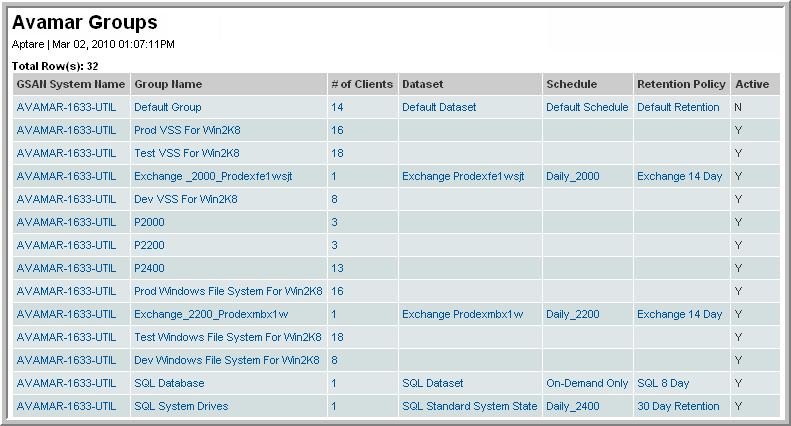EMC Avamar Groups
Use Quick Search to find a template, report or dashboard by name. Search is case insensitive, supports partial entries, and will display a list of potential matches.
As you enter the name in the Quick Search field, up to 10 potential matches are displayed. If the template, report or dashboard is shown, you can select and run it directly from the match list. You can also click All Items in the match list to go directly to the Search Results.
Use the Explorer to browse through the StorageConsole templates, dashboards and reports. The navigation pane displays templates organized by products along with user created, and system folders. This report is located here:
Backup Manager > Backup Policies > Avamar Groups
An Avamar Group provides the mechanism for applying a set of backup rules to a collection of clients. Backups are scheduled to run automatically, using the group specifications. Groups contain a Dataset, a Schedule, and a Retention Policy which comprise the backup policy for all members (clients) of the group. Each client that is to be backed up must be a member of at least one group; therefore, a Default Group provides a policy when a client has not been assigned to a more specific policy.
This report lists the groups defined on the selected Avamar servers.

GSAN System Name | GSAN (Global Storage Area Network): The name of the Avamar Data Server subsystem. Links to the Avamar Server Details |
Group Name | Links to the Avamar Group Detail |
# of Clients | Indicates the number of clients that are members of the group. Links to the Group Client Summary. |
Dataset | Identifies the content of the backup; for example, filesystems, directories, or files. The Default Dataset is inherited from the Avamar Group, but can be overridden with a specific dataset. Click on the link to view the Dataset Details. |
Schedule | The name of the Schedule that contains the scheduling details. Links to the Schedule Details. |
Retention Policy | Indicates how long the backup will be kept. Backups older than what is specified in the policy are removed from the system. Links to the Retention Policy Details. |
Active | Indicates if the group is enabled (active) |


